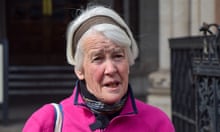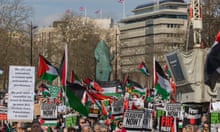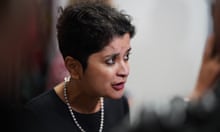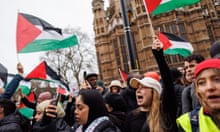Police unlawfully spied on children as young as 10 taking part in a climate strike protest in London, documents have shown.
The previously unseen papers reveal the Metropolitan police were rebuked by the information commissioner’s office (ICO) for video surveillance of the March 2019 protest, which was attended by up to 10,000 children and young people.
Ruling the data-gathering unlawful, the watchdog said the force had failed to consider the privacy rights of the children at the protest, and had not considered their entitlement to added data protections in light of their age.
The reprimand was issued in 2020 but came to light only after a freedom of information request by the civil rights campaign group Big Brother Watch, which had made a complaint about the surveillance.
“Our complaint and the information commissioner’s subsequent action sets an important precedent protecting children from unjustified political surveillance,” said Silkie Carlo, the director of Big Brother Watch.
“The police’s recording of children as young as 10 years old, peacefully demonstrating about environmental protections, was oppressive, unjustified, unlawful, and a disturbing reflection of how hostile to democratic freedoms the Metropolitan police has become.
“We urge Met commissioner Sir Mark Rowley to fulfil his legal duties to protect the public’s right to protest and ensure vital police resources are never again wasted by spying on children with opinions.”
On 15 March 2019, thousands of schoolchildren travelled to Westminster to take part in the School Strike for Climate. Part of the wave of youth climate strikes inspired by Greta Thunberg, the young Swedish activist, it was the second such protest in London in as many months, and one of scores taking place that day in cities around the world.
As part of its public order policing response, the Met deployed two evidence-gathering teams equipped with digital camcorders that can livestream to police control rooms, documents showed.
Big Brother Watch complained to the Met after witnessing the officers filming children on the protest. The information commissioner launched an investigation for a potential breach of the Data Protection Act 2018, which found the Met had acted unlawfully. In a letter issuing a reprimand to the force, the data protection regulator said it “did not demonstrate satisfactory compliance with the first data protection principle”, which is that “the processing of personal data for law enforcement reasons must be lawful and fair”.
Police “did not demonstrate that overt filming was used proportionately”, given the young ages of those who took part in the protest, the ICO said, as well as questioning how long the force intended to store the footage.
The Met told the Guardian it had made changes over how it deployed evidence gatherers on protests, with senior officers now required to consider the demographic of groups taking part and how use of the tactic might have an impact on them.
Data protection documentation had been updated, the approach to the retention of footage reviewed, and a new organisation-wide approach to data protection training implemented, the force said.
The force said it regarded filming as “essential in the prevention and detection of crime, and maintaining public safety and security” in at least some public order policing operations.
“It can support achieving a de-escalating effect on crowd behaviour, assist in the capture of best evidence during fast-moving events, in addition to informing the decision-making of public order commanders overseeing the policing of an event,” the spokesperson said. “Likewise, it can provide transparency and accountability regarding police actions.”
The ICO did not publicise the reprimand when it was first issued in June 2020. A spokesperson for the watchdog said that in the past it did not routinely publish reprimands, but had begun to do so.
Noga Levy-Rapoport, one of the organisers of the 2019 protest, said the police surveillance was intimidating and anti-democratic. “I was a minor in 2019, and I knew I was taking a risk, I was taking a risk with my entire future,” Levy-Rapoport, who is now 21, said.
“It’s a tactic that’s very commonly used by police forces to create an image of peaceful protesters, that we are almost this villainous entity. When actually what was happening in March 2019, and in all other school strikes where police had an active and intimidating presence, was that we were taking to the streets to protest for our futures.
“We were demanding, rightfully and legally, our right to a safe and secure, equitable and sustainable future.”
Jodie Beck, policy and campaigns officer at campaign group Liberty, said: “We all have the right to express ourselves without fear of being surveilled. Although this news is shocking, it is not surprising. Police hostility to protesters is being enabled and encouraged by this government’s continued and dangerous assault on protest rights. Right now, we’re seeing the government push through the public order bill which will see the gross expansion of police surveillance practices, especially through the introduction of serious disruption prevention orders.
“Instead, the government must ensure everyone’s right to protest and right to privacy are protected by rolling back police powers that endanger freedom of expression and stop people from being able to stand up for what they believe in.”










